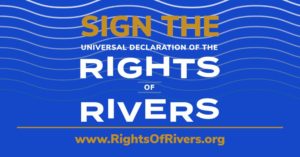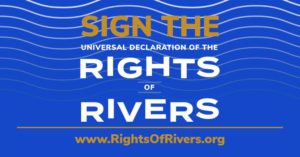September 8 2021 |
Marseille, France—

Today, advocates from across the globe gathered at the IUCN World Conservation Congress (both in person and remotely) to highlight the precipitous growth of the movement to recognize the rights of rivers and watersheds. The press conference also marked the approximate one year anniversary of the formal launch of the Universal Declaration of the Rights of Rivers (“Declaration”), a civil society initiative to define the basic rights to which all rivers are entitled. According to its proponents, the Declaration intends to build awareness and serve as a customizable legal model for governments wishing to join the rights of rivers movement.
September 8, 2021
For immediate release: September 8, 2021
Contacts:
1. Monti Aguirre, International Rivers (707-591-1220; monti@internationalrivers.org) 2. Grant Wilson, Earth Law Center (510-566-1063; gwilson@earthlaw.org)
Marseille, France—Today, advocates from across the globe gathered at the IUCN World Conservation Congress (both in person and remotely) to highlight the precipitous growth of the movement to recognize the rights of rivers and watersheds. The press conference also marked the approximate one year anniversary of the formal launch of the Universal Declaration of the Rights of Rivers (“Declaration”), a civil society initiative to define the basic rights to which all rivers are entitled. According to its proponents, the Declaration intends to build awareness and serve as a customizable legal model for governments wishing to join the rights of rivers movement.
Over the past year, rights have been recognized or declared for (at minimum) Boulder Creek and the Boulder Creek Watershed (Nederland, USA, mirroring some language from the Declaration), the Magpie River (Canada), waterways in Orange County, Florida (USA), the Alpayacu River (Ecuador), and the Paraná River and Wetlands (Rosario, Argentina). In contrast to traditional environmental laws that recognize Nature as mere human property, this legal precedent acknowledges that rivers, watersheds, and other natural entities are living entities with rights.
With regards to the Declaration, it now has support from close to 1,700 individuals and 211 organizations from over forty countries. Numerous ‘rights of rivers’ campaigns also incorporate parts of the Declaration, including in El Salvador (rights of the Lempa River), France (rights of the Tavignanu River), Mexico (rights of all rivers in Oaxaca), Nigeria (rights of the River Ethiope), Pakistan (rights of the Indus Delta and River), Serbia, and the UK (rights of the River Frome). Additionally, last week, 16 IUCN members co-sponsored an emergency motion calling upon IUCN members to endorse the Declaration, although it did not pass.
Advocates have also submitted a multitude of amici curiae briefs in defense of the ‘rights of rivers’ that specifically reference the rights recognized in the Universal Declaration of the Rights of Rivers, including briefs seeking to protect the rights of the Dulcepamba River, Piatúa River and Nangaritza River in a series of cases currently before the Constitutional Court of Ecuador. Another amicus brief seeks to protect the Marañon River in Peru based in part on the Universal Declaration of the Rights of Rivers. In one instance, an administrative body in Ecuador upheld the rights of the Dulcepamba River and ordered protection of its flows.
The momentum towards the rights of rivers is growing as a response to mounting global threats to rivers and freshwater ecosystems. According to the 2020 Living Planet Index, 944 monitored freshwater species declined by an average of 84% between 1970 and 2016. Due to an onslaught of dams and other infrastructure, only 37 percent of rivers longer than 1,000km still flow freely.
The notion of recognizing the personhood or rights of rivers gained global attention in 2017. That year, a treaty agreement between the Whanganui Iwi (a Māori tribe) and the Crown Government recognized the Whanganui River as a legal person, a Constitutional Court decision in Colombia recognized the rights of the Atrato River, and a court in Uttarakhand, India, recognized the Ganga and Yamuna Rivers as legal persons with rights (later stayed). In 2008, Ecuador became the first country to constitutionally recognize the Rights of Nature.
Quotes:
“It is obvious that effective river management works best at the basin scale, and ‘river rights’, as described in the Declaration, is a very important way of achieving this and ensuring protection of ecosystem integrity.”
–Angela Andrade, Chair of IUCN’s Commission on Ecosystem Management
“Globally, rivers have enormous social, cultural, environmental, and economic value, but are becoming progressively more threatened. The Rights of Rivers approach is becoming increasingly important for ensuring that they can continue to provide these essentials to benefit nature and the people who rely on them.”
Kristen Walker, Chair of IUCN’s Commission on Environmental, Economic and Social Policy.
“Western law and culture often treat rivers as a human resource instead of recognizing the reality that they are living systems. An important step towards correcting this falsehood is for rivers and other natural entities to be recognised in law as legal entities with intrinsic rights.”
-Jessica Sweidan, CoFounder & Trustee of Synchronicity Earth; IUCN Patron of Nature.
“The playbook for protecting rivers and watersheds must evolve beyond the traditional environmental law approaches we’ve been using since the 1960s, as such laws are helpful but grossly inadequate.The Declaration is a useful legislative starting point for those wishing to promote new, Earth-centered legal protections for fresh waters.”
–Grant Wilson, Executive Director of Earth Law Center.
“This movement towards recognizing the rights of rivers will be extremely helpful for protecting the freshwater biodiversity present in these ecologically important rivers.”
-Dr. Topiltzin Contreras Macbeath, Head of the Conservation Biology Research Group at the University of Morelos, México and Co-Chair of the Freshwater Conservation Committee of IUCN’s Species Survival Commission.
“Rivers are the veins of the Earth. They hold so much life and provide the conditions for life to evolve, flourish, and regenerate. This declaration is essential in the process of legally recognizing the inherent rights of rivers worldwide, as a way to protect their integrity, health, and role in Earth’s web of life.”
-Hana Begovic, Director of Earth Advocacy Youth.
“A global study of river protections that I recently led shows the growing importance of the Rights of Rivers movement, relative to some of the other protection systems we discussed. We concluded that Rights of Rivers is a powerful tool for recognizing Indigenous cultural plurality in legal systems, and for bringing about transformative change in the protection of nature.”
-Dr. Denielle Perry, Director of the Free-flowing Rivers Lab in Northern Arizona University’s School of Earth and Sustainability, and Co-Chair of the Durable River Protection Coalition.
“Rivers across the planet are ribbons of biodiversity that are facing unprecedented threats due to climate change and dam building. Rights of Nature for Rivers offers a path forward that combats these threats and gives rivers their rightful protection as the planet’s life-saving arteries.”
–Gary Wockner, Co-Founder of Save The Colorado and Founder of Save The World’s Rivers.
“Our current laws are not rising to address the climate and biodiversity crises. Freshwater ecosystems need permanent protections to sustain water quality, food security, and human rights. A Rights of Nature approach offers transformative change at a time where it could not be needed more.”
Monti Aguirre, Latin America Manager at International Rivers.
# # #
Find more on the Universal Declaration of the Rights of Rivers, visit www.RightsOfRivers.org See All Blog Posts

